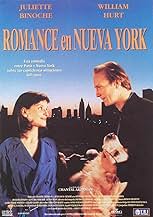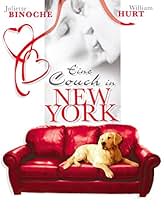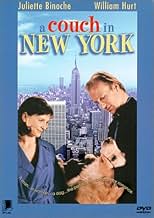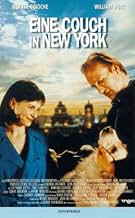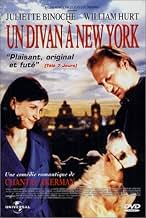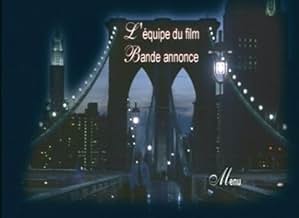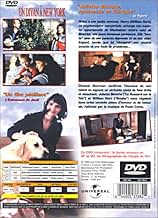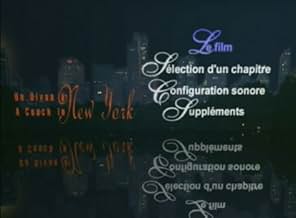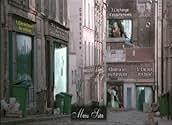IMDb-BEWERTUNG
5,9/10
2490
IHRE BEWERTUNG
Ein Psychoanalytiker in New York City tauscht seine Wohnung mit einer Frau in Paris. Wenn seine Patienten kommen, sprechen sie mit ihr und bezahlen dann. Er kehrt frühzeitig nach New York zu... Alles lesenEin Psychoanalytiker in New York City tauscht seine Wohnung mit einer Frau in Paris. Wenn seine Patienten kommen, sprechen sie mit ihr und bezahlen dann. Er kehrt frühzeitig nach New York zurück und wird zum Patienten.Ein Psychoanalytiker in New York City tauscht seine Wohnung mit einer Frau in Paris. Wenn seine Patienten kommen, sprechen sie mit ihr und bezahlen dann. Er kehrt frühzeitig nach New York zurück und wird zum Patienten.
- Auszeichnungen
- 1 Gewinn & 1 Nominierung insgesamt
Boris Lyoskin
- Cab Driver #1
- (as Boris Leskin)
Tiffany Fraser
- Julie
- (as Tiffany Frazer)
Empfohlene Bewertungen
Dr. Henry Harriston, a psychoanalyst, is so sick of his patients he puts an ad in the Herald-Tribune asking to swap his New York apartment for one in Paris. Beatrice, who answers the ad because her friend Anne lives in New York, seems to get the better part of the deal. Dr. Harriston has a fabulous apartment and Beatrice's building is noisy and falling apart. Then Dr. Harriston's patients start showing up at his place. Also, Dr. Harriston's dog Edgard is lethargic and has intestinal problems. Meanwhile, Beatrice has a number of men after her, mostly borderline insane.
Juliette Binoche is pretty and so charming, and she really shows genuine concern for Dr. Harriston's patients--one in particular. Richard Jenkins does something unique and unexpected as one of the patients. And William Hurt eventually does show his talent as well. Most of the leading actors gave good performances.
The first half was quite funny, but the second half leaned more toward drama. Though there were funny moments, such as when Dr. Harriston tried to carry on a conversation with his friend Dennis while Dennis was taking an order at a restaurant.
The ending was very sweet. Overall, this film was worth seeing.
Juliette Binoche is pretty and so charming, and she really shows genuine concern for Dr. Harriston's patients--one in particular. Richard Jenkins does something unique and unexpected as one of the patients. And William Hurt eventually does show his talent as well. Most of the leading actors gave good performances.
The first half was quite funny, but the second half leaned more toward drama. Though there were funny moments, such as when Dr. Harriston tried to carry on a conversation with his friend Dennis while Dennis was taking an order at a restaurant.
The ending was very sweet. Overall, this film was worth seeing.
This mess needed a Lubitsch touch if it was ever going to succeed, and Akerman is no Lubitsch. Bad script, poor acting (although it is amusing to hear Hurt's French--what is behind this trend for American actors in French roles?; cf Malkovich in Temps Retrouve). When the best scene is a dog swimming in Central Park lake, you've got trouble.
I think the first minutes and the end are great moments of comedy. Nevertheless if I were the director I would have explored more the situation of the characters, he in Paris, she in New York, with a lot of gags, to put them together only in the end. His sudden return to New York slows the funny rythm of the beginning in my opinion and puts us into a series of pseudo romantic very weak scenes like those sessions with Hurt on the couch and Binoche uttering monosyllabes all the time. And one "intelligent" question: how could she got the dog into the plane right in the hour in spite of all those very strict rules about animals travelling abroad?
"Juliette Binoche cannot act", according to 'anonnymous' below. That is
a ridiculous assertion. As is to link this film with Kieslowski's
'Blue'. The problem with this movie is that neither Binoche nor Hurt are
given the material in the form of a good screenplay nor the direction to
make the film work. It seems to me that Akerman, who is an excellent
director, see La Captive, does not have a good enough command of English
to write a screenplay in the language.
The film, which starts out nicely quickly gets bogged down in the
psychoanalyitical. Endless "yes" and "mmmmm"s loose their amusement
value quickly. The romance angle is badly developed, just why has
Beatrice fallen for John Wire aka Henry? It doesnt work.
But Juliette Binoche can act. In fact in Europe she is regarded with
Isabelle Huppert to be the finest actress working today. But she can
only produce the goods when she is given the material and the careful
direction necessary. Go rent "Rendez-Vous", "The Unbearable Lightness of
Being", "Les Amants du Pont-Neuf", "Three Colours Blue", "Alice &
Martin", "The Widow of Saint-Pierre" and especially "Code Innconnu" and
try arguing otherwise.
a ridiculous assertion. As is to link this film with Kieslowski's
'Blue'. The problem with this movie is that neither Binoche nor Hurt are
given the material in the form of a good screenplay nor the direction to
make the film work. It seems to me that Akerman, who is an excellent
director, see La Captive, does not have a good enough command of English
to write a screenplay in the language.
The film, which starts out nicely quickly gets bogged down in the
psychoanalyitical. Endless "yes" and "mmmmm"s loose their amusement
value quickly. The romance angle is badly developed, just why has
Beatrice fallen for John Wire aka Henry? It doesnt work.
But Juliette Binoche can act. In fact in Europe she is regarded with
Isabelle Huppert to be the finest actress working today. But she can
only produce the goods when she is given the material and the careful
direction necessary. Go rent "Rendez-Vous", "The Unbearable Lightness of
Being", "Les Amants du Pont-Neuf", "Three Colours Blue", "Alice &
Martin", "The Widow of Saint-Pierre" and especially "Code Innconnu" and
try arguing otherwise.
In Couch in New York, the first American film by acclaimed Belgian director Chantal Akerman, Dr. Henry Harriston (William Hurt) is a dour New York psychoanalyst who is close to exhaustion. He decides to place an ad in the Paris Herald Tribune offering to swap his New York apartment for a month. Henry ends up in the digs of a free-spirited dancer from Paris, Beatrice Saulnier (Juliet Binoche) and she takes over his swank New York penthouse. Obviously well to do, Henry's apartment is spacious, impeccably furnished, and meticulously cared for, while hers is messy, bohemian, and funky.
In what Ms. Akerman describes as "what Hollywood calls a double fish out of water film", this film is something of a curiosity yet it's one of the best screwball romantic comedies I've seen. The premise is totally ludicrous of course and off the wall but that's what makes it so special. Of course, I'm particularly open to films that pop the bubble of the psychiatric establishment.
Apparently Henry forgets to tell his patients he is going away and they come knocking on Ms. Saulnier's door and calling for appointments, hardly even noticing the change in doctors. Being a sweet and sympathetic soul and not wanting to turn people away, she listens to their stories for an hour and they pay her money for her advice (illegally of course). She learns quickly that all analysts have to say is "yeees" or "hmmmm" or "what comes to mind now?" and get paid big bucks. Of course, patients have the right to remain silent and sometimes nothing comes to mind (they can sometimes spend an hour in total silence and must still pay for the privilege). Ms. Saulnier is an understanding person and a good listener and, in quite a slap at the "professionals", achieves more success with Henry's patients (not to mention his dog Edgar) in one week than he apparently has in years.
Beatrice decides to continue to pretend to be Dr. Harriston's assistant and studies up on her Freud. Meanwhile in Paris, Henry must contend with Beatrice's aggressive boy friends, messy rooms, leaky plumbing and the hammering of a roof being repaired. Fed up with the problems in Paris, he returns to New York to stay with an old friend in a down home part of Brooklyn. Conveniently for the plot, the good doctor stops off at his office and finds Beatrice playing psychoanalyst and his patients miraculously improved. Finding Ms. Saulnier intriguing and attractive, he goes along with her game, pretending to be her patient. This sets off a process of mutual discovery and self-awareness that is quite predictable but nonetheless amusing and enlightening.
This was my first Akerman film and while I realize it is totally unlike her others, I really loved it and found both leads to be superb. Binoche never looked more alluring and Hurt is terrific in his role as the deadpan doctor. I don't know who's crazy, the majority of critics who trashed it or me, but I know for sure one of us is ready for the couch. I won't say any more about Couch in New York except that while it does unfold its magic at a very leisurely pace, the rewards are there for the patient (no pun intended). Since the ending left me with such a warm, fuzzy feeling, I'm thinking of calling Ms. Binoche and.well.on second thought.
In what Ms. Akerman describes as "what Hollywood calls a double fish out of water film", this film is something of a curiosity yet it's one of the best screwball romantic comedies I've seen. The premise is totally ludicrous of course and off the wall but that's what makes it so special. Of course, I'm particularly open to films that pop the bubble of the psychiatric establishment.
Apparently Henry forgets to tell his patients he is going away and they come knocking on Ms. Saulnier's door and calling for appointments, hardly even noticing the change in doctors. Being a sweet and sympathetic soul and not wanting to turn people away, she listens to their stories for an hour and they pay her money for her advice (illegally of course). She learns quickly that all analysts have to say is "yeees" or "hmmmm" or "what comes to mind now?" and get paid big bucks. Of course, patients have the right to remain silent and sometimes nothing comes to mind (they can sometimes spend an hour in total silence and must still pay for the privilege). Ms. Saulnier is an understanding person and a good listener and, in quite a slap at the "professionals", achieves more success with Henry's patients (not to mention his dog Edgar) in one week than he apparently has in years.
Beatrice decides to continue to pretend to be Dr. Harriston's assistant and studies up on her Freud. Meanwhile in Paris, Henry must contend with Beatrice's aggressive boy friends, messy rooms, leaky plumbing and the hammering of a roof being repaired. Fed up with the problems in Paris, he returns to New York to stay with an old friend in a down home part of Brooklyn. Conveniently for the plot, the good doctor stops off at his office and finds Beatrice playing psychoanalyst and his patients miraculously improved. Finding Ms. Saulnier intriguing and attractive, he goes along with her game, pretending to be her patient. This sets off a process of mutual discovery and self-awareness that is quite predictable but nonetheless amusing and enlightening.
This was my first Akerman film and while I realize it is totally unlike her others, I really loved it and found both leads to be superb. Binoche never looked more alluring and Hurt is terrific in his role as the deadpan doctor. I don't know who's crazy, the majority of critics who trashed it or me, but I know for sure one of us is ready for the couch. I won't say any more about Couch in New York except that while it does unfold its magic at a very leisurely pace, the rewards are there for the patient (no pun intended). Since the ending left me with such a warm, fuzzy feeling, I'm thinking of calling Ms. Binoche and.well.on second thought.
Wusstest du schon
- WissenswertesChantal Akerman has since criticized her actors, William Hurt and Juliette Binoche, for not helping her promote the movie, after early mixed reception and production problems. Akerman has since said that both actors were difficult to work with and that Binoche was "as cold as an ice cube".
- Zitate
Beatrice Saulnier: Freud and all this stuff, it's very enlightening, huh?
Top-Auswahl
Melde dich zum Bewerten an und greife auf die Watchlist für personalisierte Empfehlungen zu.
- How long is A Couch in New York?Powered by Alexa
Details
- Erscheinungsdatum
- Herkunftsländer
- Offizieller Standort
- Sprachen
- Auch bekannt als
- A Couch in New York
- Drehorte
- Babelsberg, Potsdam, Brandenburg, Deutschland(Studio, interiors)
- Produktionsfirmen
- Weitere beteiligte Unternehmen bei IMDbPro anzeigen
Box Office
- Weltweiter Bruttoertrag
- 1.513 $
- Laufzeit1 Stunde 48 Minuten
- Farbe
- Sound-Mix
- Seitenverhältnis
- 1.85 : 1
Zu dieser Seite beitragen
Bearbeitung vorschlagen oder fehlenden Inhalt hinzufügen

Oberste Lücke
By what name was Eine Couch in New York (1996) officially released in India in English?
Antwort

